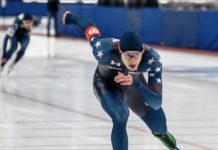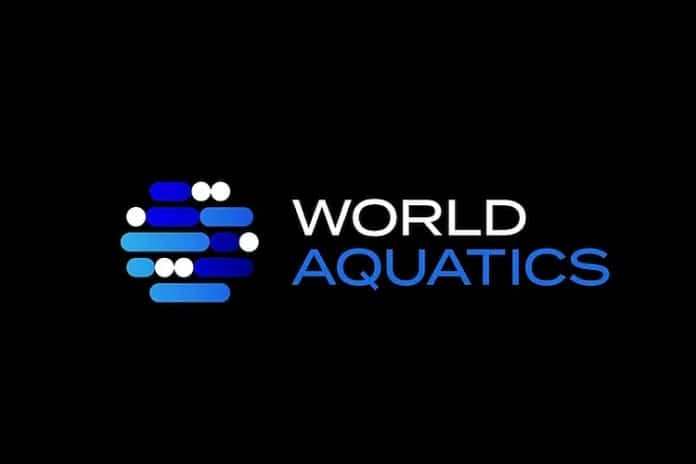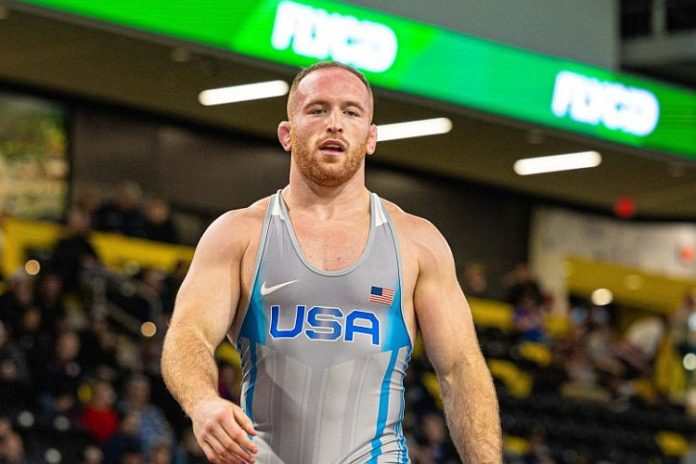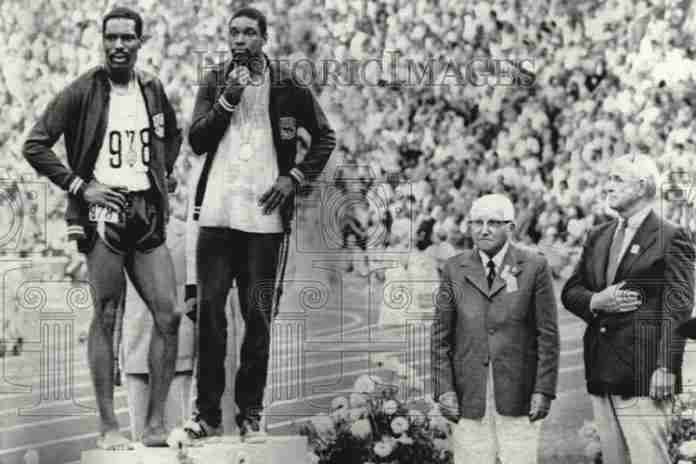The Sports Examiner: Chronicling the key competitive, economic and political forces shaping elite sport and the Olympic Movement.
Enjoying our coverage? If so, please consider a donation to help cover technical costs for 2023. Thank you for your support.
To get The Sports Examiner by e-mail: sign up here!
≡ THE 5-RING CIRCUS ≡
1. USOPC Chair Lyons says only talks planned, no quick Russian return
2. Paris 2024 board approves revised €4.38 billion budget
3. First World Cup semi pits Argentina vs. Croatia Tuesday
4. FINA Congress changes name to World Aquatics
5. USATF office overrides Board choice of marathon trials site
U.S. Olympic & Paralympic Committee Chair Susanne Lyons told reporters on Monday that the International Olympic Committee is looking for a pathway to return Russian and Belarusian athletes to competition, but strictly as “neutral” athletes who have been adequately tested for doping and who wear no identification or colors of their country. But she noted that the process is only in the talking stages now and that the IOC wants only to re-admit athletes “who had not actively supported the conflict.” The Paris 2024 organizing committee board of directors approved an increase in the budget to €4.38 billion (about $4.62 billion U.S.) as expected, thanks to increased revenue expectations from sponsors and ticketing, but also money from governments for the Paralympic Games, sports and anti-doping lab equipment. Tuesday will see the first FIFA World Cup semifinal, matching Argentina’s offense – including star Lionel Messi – against Croatia’s dogged defense. The FINA Congress, meeting in extraordinary session in Melbourne, Australia, approved a change-of-name of the organization to World Aquatics. Runner’s World reported that the USA Track & Field National Office selected Orlando, Florida as the site for the 2024 U.S. Olympic Marathon Trials, setting aside the recommendation of its own Board for Chattanooga, Tennessee, the second time in the last three editions the headquarters had ignored membership or Board recommendations.
1.
USOPC Chair Lyons says only talks planned,
no quick Russian return
The U.S. Olympic & Paralympic Committee held its last Board meeting of the year last week and Chair Susanne Lyons and chief executive Sarah Hirshland briefed reporters on Monday morning. But most of the questions were about Lyons’ attendance at the Olympic Summit in Lausanne last Friday, and the resulting Declaration that outlined a possible way back to competition for Russian and Belarusian athletes through events in Asia rather than Europe.
Lyons, however, tried to emphasize that immediate action was not the goal:
“[W]hat the Summit unanimously agreed to was to allow the [International Olympic Committee] to have dialogue, and to have some consultation with all key stakeholders to see how, when, if, that could happen. …
“I think the conversation was really more the conceptual level of, what is, first of all, our role as a Movement. We have always said that our role is to engender peace through unity in sport and there are conflicts – most of them not as egregious as the one currently happening in Ukraine – but there are conflicts around the world every day. There are countries at war every day. And if people begin to kind of decide that they want to boycott things, to do a tit-for-tat – you didn’t come to our Games, so we’re not going to come to your Games – very quickly, the whole fabric of the Olympic and Paralympic Movement falls apart.
“And that’s really what the nature of the conversations were. How do we find a way to begin to find a path to reunification, not necessarily by welcoming the countries back in, but by finding a way for their athletes to participate as clean and neutral athletes.
“But that really was the nature of the conversation. There was absolutely regard and understanding and sympathy for the situation that continues in Ukraine and a lot of unhappiness and anger toward those who have perpetrated that. But at the same time, we don’t want to hold the individual athletes accountable for the actions of their governments.”
Although the discussion was about the concept of a return to competition, the issue remains Russia and its ally, Belarus. Lyons explained:
“So, Russia has shown, I think, time and again, that they are not necessarily always following the rules that we would like to see followed, so the decisions that the Summit made this weekend are really not about allowing Russia or Belarus – the countries – to participate again. There was a lot of discussion about whether athletes who happen to have been born in those countries, and have passports from those countries, have a pathway whereby they can compete as clean [from doping] and neutral athletes going forward.
“And I think there is a fair amount of desire over time for that to be able to happen because our mission is to bring the world together in peace through sport. So prohibiting individual athletes from competing, from having the right to compete, is hard for the Movement to tolerate. At the same time, that doesn’t mean that people are in any way ready to forgive and forget some of the past behavior from Russia.
“So the discussion was not about lifting any sanctions whatsoever from Russia or Belarus; those sanctions remain firmly in place, and as a reminder, those sanctions include not having any competitions in those countries, and if those athletes were to return as neutrals, there could be no display of flags, of anthems, no national colors nor country name for any participating athletes.
“Now you may remember, that was a little loosey-goosey last time [allowing ‘Olympic Athletes from Russia’ at the 2018 PyeongChang Winter Games], and I think everyone at the Olympic Summit was very clear that there’s only a pathway back for these individual athletes if they are competing as clean and neutral in every possible way.”
And Lyons acknowledged the difficult task for the IOC and its stakeholders not to make a mockery of the sanctions as Russia’s war against Ukraine continues:
“In the past, when they competed as ‘neutrals,’ it was still with the same colors, it still had the word ‘Russia’ in it, there was absolute agreement in the room this would have to be strict neutrality; what that would be, I don’t know, but it could not include – the sanctions are very specific – it can’t be the colors, it can’t be the name of the country. So I think a stricter neutrality would have to be maintained.
“They also talked about the athletes have to have – this is going to be impossible to figure out how they would monitor it – but the athletes are supposed to have, you know, on their own, not have been supporting the actions of their government in terms of their offense against Ukraine.
“So, that was discussed; I don’t know how they could possibly really know whether an athlete is or is not supportive of their government actions, but there was at least an agreement that they would want to have athletes who had not actively supported the conflict.”
Hirshland noted that the USOPC is continuing to monitor the situations of the Kamila Valieva (RUS) doping case now in front of the Court of Arbitration for Sport and the IOC Executive Board’s announcement of the revised process for the selection of a 2030 Winter Games host:
● “It is so important that the figure skating Team Event athletes who competed in Beijing get the resolution they deserve. Recall we still have a wildly successful team of athletes who have not yet been awarded a medal and while they aren’t sure what color that medal will be, we have their backs, we’re anxiously awaiting for the day when they get those medals and the celebration that comes with it. They are top-of-mind for us, every day.”
● “We came out of that [Winter Games] news, and the announcements from the Executive Board meeting incredibly, incredibly encouraged. As you know, we have been working quite closely with the Salt Lake City-Utah organization for the Games and I think we all, collectively, had a smile on our faces as we came out of that news.
“Salt Lake and the Utah region is so well positioned to be considered, long-term and over not just looking at ‘30 and ‘34, but even longer than that. It is a region and a part of the country here that will always be ready to host these Games. So we’re excited about that, we’re encouraged by the news. We have and will continue to remain flexible and nimble and adaptive, as the IOC modifies its timelines and schedules, but as Salt Lake and the Utah folks would tell you, that Salt Lake is ready, and we too at the USOPC are ready and eager and feel incredibly encouraged and confident about what’s in store for us on the Winter Games front.”
Hirshland also noted that the Commission on the State of the U.S. Olympics and Paralympics actually had its first meeting last Friday (9th) and is ramping up for its work in 2023.
For Lyons, it was her last USOPC Board meeting as she prepares to leave 12 years of service as a Board member and as the interim chief executive between the exit of Scott Blackmun and the hiring of Hirshland. Gene Sykes, who was the chief executive of the LA28 bid effort, takes over as the new USOPC Chair on 1 January.
2.
Paris 2024 board approves revised €4.38 billion budget
As expected, the Paris 2024 Board of Directors approved the third edition of the organizing committee’s budget at €4.38 billion (~$4.616 billion U.S. today) to correspond with rising costs, but also with some expansion in available revenue.
The budget adopted in 2020 was for €3.9 billion; the revenue comparisons:
● IOC contribution: €1.219 billion in 2020; €1.238 billion now (+1.6%)
● Sponsorships: €1.088 billion in 2020; €1.226 billion now (+12.7%)
● Ticketing: €1.165 billion in 2020; €1.423 billion now (+22.1%)
● Licensing: €127 million in 2020; €130 million now (+2.4%)
● Government: €100 million in 2020; €171 million now (+17.1%)
● Other: €204 million in 2020; €193 million now (-5.4%)
The added revenues in sponsorships and ticketing have allowed an increase in security funding of €35 million, with the contingency funding maintained at €200 million. The organizers met their goal of having 80% of the originally targeted sponsorship total contracted by the end of 2022.
Some of the increases due to inflation and supply-chain issues were met by increased public funding for the Paralympic Games – from €100 million to €171 million – and €40 million of Games “legacy” costs will be taken up by the national and Paris-region governments to cover sports equipment, anti-doping lab equipment and other projects.
3.
First World Cup semi pits Argentina vs. Croatia Tuesday
Now down to the final four, the first semifinal of the 2022 FIFA World Cup has two-time champion Argentina facing 2018 runner-up Croatia at the Lusail Iconic Stadium at 10 p.m. local time on Tuesday, or 2 p.m. Eastern time in the U.S. How they got here:
Argentina (4-1):
● Lost to Saudi Arabia, 2-1
● Defeated Mexico, 2-0
● Defeated Poland, 2-0 (Won Group C)
● Defeated Australia, 2-1
● Defeated Netherlands, 2-2 (4-2 penalty kicks)
Croatia (3-0-2):
● Tied Morocco, 0-0
● Defeated Canada, 4-1
● Tied Belgium, 0-0 (2nd in Group F)
● Defeated Japan, 1-1 (3-1 penalty kicks)
● Defeated Brazil, 1-1 (4-2 penalty kicks)
Argentina should be used to the Lusail Stadium by now; this will be the third time it has played there, vs. none for Croatia. If the first five games are any guide, the match will be played with Argentina’s offense testing Croatia’s rock-solid defense:
Argentina in 5 matches:
● 9-5 on goals, 71-22 on shots, 62% possession
Croatia in 5 matches:
● 6-3 on goals, 55-66 on shots, 46% possession
Croatia will also have no trouble defending and then going to penalty kicks; in their World Cup history, the team is 4-0, beating Denmark and Russia in 2018 and then Japan and Brazil in Qatar. Argentina is almost as good, at 5-1 all-time in World Cup games decided by penalties.
And look for late strikes from Croatia, which has scored three of its six goals from the 70-minute mark onwards; Argentina has been outscored, 3-2, in late goals in its five games.
The teams have met twice at the World Cup before: a 1-0 win for Argentina in 1998 in group-stage play and a 3-0 Croatia win in the group stage in 2018.
Argentina star striker Lionel Messi now ranks equal-8th all-time in World Cup scoring with 10 total goals (in 24 appearances) and four in this tournament; he has scored in five different World Cups. Midfielder Andrej Kramaric leads Croatia with two goals, both against Canada.
The sharpies have the odds at -128 for Argentina (stake $100 to win $128), while Croatia is +375, a big underdog … just the way they like it.
Defending champion France will face Morocco in the second semi on Wednesday, with the final coming on Sunday (18th).
¶
The International Sports Journalists Association (AIPS) Web site noted a third media death during the World Cup in Qatar, this time Qatari photographer Khalid al-Misslam, 44, of Al-Kass Television “passed away suddenly” – apparently from a heart attack – on Sunday, according to his employer Alkass, the eight-channel Qatar sports network.
American Grant Wahl passed away on Friday and Britain’s ITV Technical Director, Roger Pearce, 65, also died in November, in Qatar for the World Cup.
Wahl’s body was returned to the U.S. on Monday and State Department spokesperson Ned Price said an autopsy would be performed to determine the cause of death.
¶
FIFA reported that all World Cup players were tested for doping at least once prior to the tournament, with 2,846 conducted since January, and “every player in the squads of the eight quarter-finalists being tested on average four and a half times since January 2022.”
FIFA itself has carried out 1,433 tests, including 369 in Qatar during the tournament so far.
¶
Data from payments processor Visa through the group stage of the World Cup showed that 47% of spending at the event was for merchandise, 36% for food and drinks and just 11% for the few tickets that remained available.
The top match for total spending was Saudi Arabia vs. Mexico on 30 November; the match which had the highest average transaction was the U.S.-Iran match on 29 November at $29.
¶
In addition to the “OneLove” captain’s armbands which were proposed by several European teams to wear at the Qatar World Cup, a separate proposal was being formed by Qatari officials for an armband reading – in English – “No place for Islamophobia” and featuring a Palestinian headscarf pattern.
Sky News reported, from an unnamed senior Qatari official:
“Prior to the start of the tournament, Qatar, and some of the other Muslim-majority teams, were in advanced discussions regarding whether the players could wear armbands raising awareness for the growing movement of Islamophobia.
“When the armband proposal was eventually discussed with FIFA, they were told that it violated FIFA’s rules and would not be allowed.
“The teams accepted the decision but were disappointed that an important issue such as this, which negatively impacts the millions of Muslims around the world, was not being given a platform during the first World Cup to be hosted in a Muslim-majority region.”
The other teams apparently consulted included Morocco and Saudi Arabia.
4.
FINA Congress changes name to World Aquatics
A FINA Extraordinary Congress just ahead of the World 25 m Championships in Melbourne (AUS) confirmed a new constitution for the organization that will see an Independent Aquatics Integrity Unit begin work on 1 January 2023.
Term limits were also approved, along with an expansion of the governing Bureau to add women (to now be 38% of the total).
But the big change was in the branding of the federation, as proposed by President Husain Al-Musallam (KUW):
“I can tell you that there is a strong feeling that we should change our name. FINA is our past, and we should look back to much of the past with a bright affection, but our future must begin here today.
“If we are going to have a name change, then of course – it’s a big question – what should be the new name? I always believe in listening to the experts, and we brought in Martin Group, which specialize in building brands. They suggested many different options for a new name.
“The proposed names were tested, among athletes, coaches, administrators, fans, and many others. One name has come out, clearly, on the top. This is the name that I recommended to you today. It is the name that I hope will become our new identity for the generations to come.
“So I know you are keen to find out what is this new name. The clear recommendation is that our new name should be ‘World Aquatics’.”
Aquatics now joins archery, athletics, rowing, rugby, sailing, taekwondo, triathlon, the World Baseball-Softball Confederation, World Karate and World Skate among current and recent Olympic-sport federations in using the “world” prefix before their sport names.
The new constitution, which included the name change, was approved by 175-4, with four abstentions.
The Congress also approved the financial report, which showed a 2022 forecast of a loss of $32.6 million due to the heavy cost of the 2022 World Championships, but a projected surplus of $6.66 million in 2023 and $36.75 million in 2024 due to an expected $36.00 million share of the IOC’s television revenues from the Paris 2024 Olympic Games.
Athlete and federation financial support is going up and is projected at $170 million over the eight years of 2016-24, up to $12.28 million for 2024. Reserves totaled $101.52 million at the end of 2021, with a projection to reach $125 million in 2024.
The new branding program will be rolled out in stages, expected to be fully implemented by the middle of 2023.
5.
USATF office overrides Board choice of marathon trials site
A Runner’s World story posted Monday notes that the 9 October 2022 minutes of the USA Track & Field Board of Directors included an “advisory vote” to recommend the 2024 U.S. Olympic Marathon Trials be awarded to Chattanooga, Tennessee, but “Final approval still remains with the USATF National Office” as required by USATF regulations.
On 8 November, however, it was announced that the Trials will be going to Orlando, Florida.
This is the second time in the last three editions that the USATF National Office has selected a site other than that proposed to it by either the Long Distance Running Committees or the USATF Board of Directors. The 2016 event was recommended to go to Houston, but Los Angeles was chosen instead and ended with a hot and difficult race that was poorly attended in the downtown area.
The selection event for 2020 went to Atlanta, which received high marks for organization and for efforts to deal with projected heat and humidity.
A question about the decision was raised by reporter Sarah Lorge Butler, and she was referred to USATF Board Chair Mike Conley, who sent back an e-mailed reply that included
“The USOPC is looking into the matter and until I hear back from them I have no comment.”
The USOPC actually owns the rights to the “Olympic Trials” name by federal law and must approve site designations by national governing bodies. Moving sites is hardly new; in addition to the marathon race moves, the track & field selection meet for the Tokyo 2020 Olympic Games was originally given to Mt. San Antonio College in Walnut, California, but later rescinded and handed to Eugene, Oregon and the new Hayward Field (where it was held in 2021).
The Runner’s World story said that subsequent to the Board vote to recommend Chattanooga, its bid was disqualified and no one would say why.
≡ WORLD CHAMPIONSHIPS ≡
● Swimming ● The World Aquatics (!) World 25 m Swimming Championships have begun in Melbourne, Australia, with the U.S. and Australia expected to headline the medal table.
Winners from 2021 in 12 of the men’s events and 11 of the women’s events are entered:
Men:
● Freestyle: Ben Proud (GBR, 50 m), Alessandro Miressi (ITA, 100 m), Sun-woo Hwang (KOR, 200 m);
● Backstroke: Shaine Casas (USA, 100 m), Radoslaw Kawecki (POL, 200 m);
● Breaststroke: Nic Fink (USA, 50 and 200 m);
● Butterfly: Nicholas Santos (BRA, 50 m), Matteo Rivolta (ITA, 100 m), Alberto Razzetti (ITA, 200 m);
● Medley: Daiya Seto (JPN, 200 and 400 m).
Women:
● Freestyle: Siobhan Haughey (HKG, 100 and 200 m), Bingjie Li (CHN, 400 and 800 m);
● Backstroke: Maggie MacNeil (CAN, 50 m), Louise Hansson (SWE, 100 m);
● Breaststroke: Qianting Tang (CHN, 100 m);
● Butterfly: MacNeil (100 m), Yufei Zhang (CHN, 200 m);
● Medley: Sydney Pickrem (CAN, 200 m), Tessa Cieplucha (CAN, 400 m).
The prize pool is $2.16 million, with event prizes of $10,000-8,000-7,000–6,000-5,000-4,000-3,000-2,000, and a $25,000 bonus for world short-course records.
The competition will continue through Sunday.
≡ PANORAMA ≡
● World Games 2022: Birmingham ● The World Anti-Doping Agency published its follow-up report from the 2022 World Games in Birmingham, Alabama.
The report noted that the event had about 3,450 athletes from 99 countries, competing in 34 sports. The budget was tight and the event ended with a considerable loss, so the total of 288 in-competition tests (8.3% of athletes) was not surprising. There were also 96 samples taken in out-of-competition tests. No doping violations were reported.
The testing itself was done by the U.S. Anti-Doping Agency under contract from the International Testing Agency, with analysis at the WADA-accredited lab in Salt Lake City, Utah.
● Athletics ● The Athletics Integrity Unit announced Friday a cheating scheme in the fabrication of results:
“Following a year-long investigation, the Athletics Integrity Unit (AIU) has charged senior officials of the Albanian Athletics Federation for alleged breaches of the World Athletics’ Integrity Code of Conduct relating to the submission to World Athletics of a competition result for Albanian long jumper, Izmir Smajlaj, which contributed to him securing a universality place to participate in the Tokyo 2020 Olympic Games.”
The specific incident was the reported 8.16 m (26-9 1/4) performance by Smajlaj, a seasonal best by four inches and a lifetime best – his first in two years – by two inches. He finished 18th in the qualifying at Tokyo, jumping 7.86 m (25-9 1/2).
¶
World Athletics released a study report earlier this month that documented “abusive comments sent to athletes via social media” during the 2022 World Athletics Championships.
Accounts of 461 athletes – about a quarter of all the competitors in Eugene last summer – were monitored on Instagram and Twitter from 10 July to 1 August. In all, 427,764 posts were captured for analysis, with “59 targeted discriminatory posts were identified coming from 57 unique authors, with 27 of the 461 tracked athletes receiving targeted abuse.”
Almost 60% of the abuse was on Twitter and the study noted, interestingly, “Abuse tended to be driven by events outside of competition – athletes were targeted over controversies associated with athletics, but not necessarily driven by results in the stadium.”
The leading types of abuse were sexualization (29%), slurs (20%) and racism (19%). Did anything happen? Yes:
“59% of abusive posts were deemed to warrant intervention from the social platforms, with 5% considered so egregious that World Athletics is considering further sanctions against these individuals, including sending evidence and reports to national law enforcement agencies.”
● Esports ● A Bloomberg report published last week noted significant financial stress in the esports industry “as funding sources dwindle and signs abound that athletic competition via video games doesn’t have anywhere near the earning potential investors anticipated.”
Instead of quickly turning profits, professional esports projects have continued to show losses, and “after a boom five years ago, several prominent esports teams and organizations, particularly in the U.S., are contracting, the result of a broad economic downturn, a venture capital industry that’s no longer willing to accept growth without profits and a crypto meltdown that has undercut a significant source of backing.”
This has implications for the Olympic Movement, which has been drawing closer and close to the online gaming industry as a future element of the Olympic Games. The IOC will be hosting its first Olympic Esports Week in Singapore from 22-25 June 2023.
● Figure Skating ● U.S. Figure Skating announced Tracy Marek, a 19-year veteran of marketing with the NBA’s Cleveland Cavaliers as its new chief executive, beginning in January 2023.
She rose to be the Cavaliers’ Executive Vice President and Chief Marketing Officer, responsible for all marketing, brand and creative strategy. She’s well versed in major events, including the 2022 NBA All-Star Game, for which she led the branding, vision, community preparedness and visibility efforts.
¶
You can receive our exclusive TSX Report by e-mail by clicking here. You can also refer a friend by clicking here, and can donate here to keep this site going.
For our updated, 951-event International Sports Calendar for 2022-23 and beyond, by date and by sport, click here!























